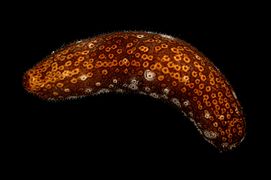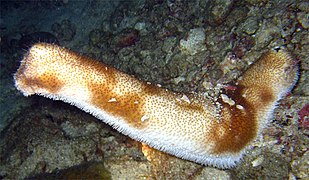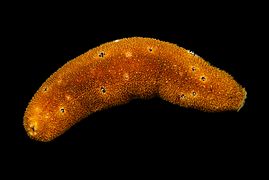Bohadschia
Appearance
| Bohadschia | |
|---|---|

| |
| Bohadschia argus | |
| Scientific classification | |
| Domain: | Eukaryota |
| Kingdom: | Animalia |
| Phylum: | Echinodermata |
| Class: | Holothuroidea |
| Order: | Holothuriida |
| Family: | Holothuriidae |
| Genus: | Bohadschia Jaeger, 1833 [1] |
| Type species | |
| Bohadschia marmorata Jaeger, 1833
| |
| Species | |
|
12–14 species (see text) | |
| Synonyms | |
| |
Bohadschia is a genus of sea cucumbers in the family Holothuriidae.[1][2] They are among the largest, most common, and conspicuous sea cucumbers on coral reefs. They have large, loaf-like bodies that are often strikingly colored.[2]
Species
[edit]As of 2024[update], the World Register of Marine Species recognizes 12 species in the genus Bohadschia:[1]
- Bohadschia argus (Jaeger, 1833)
- Bohadschia atra (Massin, Rasolofonirina, Conand & Samyn, 1999)
- Bohadschia cousteaui (Cherbonnier, 1954)
- Bohadschia koellikeri (Semper, 1868)
- Bohadschia maculisparsa (Cherbonnier & Féral, 1984)
- Bohadschia marmorata (Jaeger, 1833)
- Bohadschia mitsioensis (Cherbonnier, 1988)
- Bohadschia ocellata (Jaeger, 1833)
- Bohadschia paradoxa (Selenka, 1867)
- Bohadschia steinitzi (Cherbonnier, 1963)
- Bohadschia subrubra (Quoy & Gaimard, 1834)
- Bohadschia vitiensis (Semper, 1868)
In addition, two undescribed species are known:
- Bohadschia sp. 1 – Known from Bali, Okinawa Island, the Philippines, and Hawaii.[2]
- Bohadschia sp. 2 – Known only from a single tissue sample from the Red Sea; may be synonymous with Bohadschia steinitzi.[2]
References
[edit]- ^ a b c "Bohadschia Jaeger, 1833". WoRMS. World Register of Marine Species. 2023. Retrieved 29 January 2023.
- ^ a b c d Kim, Sun W.; Kerr, Alexander M. & Paulay, Gustav (2013). "Colour, confusion, and crossing: resolution of species problems in Bohadschia (Echinodermata: Holothuroidea)". Zoological Journal of the Linnean Society. 168 (1): 81–97. doi:10.1111/zoj.12026.
Further reading
[edit]- Francis W.E. Rowe, A review of the family Holothuriidae (Holothuroidea : Aspidochirotida), vol. 18 n°4, Bulletin of the British Museum (Natural History), 1969, 54 p.







